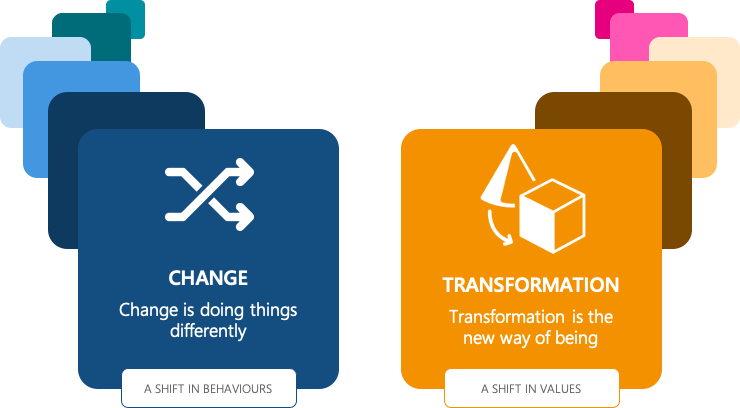In a recent company survey Flock completed for a major global brand, 200+ respondents from a whole variety of markets and disciplines all extolled the virtues for working for the company and how much they loved the brand. In the next breath the process sucked, there was no clear roles and responsibilities and what process/reporting structure was in place killed agility and inevitably great creative. So looking at these two piece of insight it appears to be a quick fix. Re-define the process, allocate RASCIs and you are good to go. If only it was that easy. Of course, both of those are super important, but if employees are expected to radically change the way they work, transformation needs to be at the heart of what the company does not change. Before we go any further, let’s try and put some clarity behind the difference of the two.

On the surface there appears to be little difference between the two, but in fact the experience and net result are very different especially if they are poorly executed. When we experience something new from something we had earlier, we can call this change. “No one likes change” is a familiar term, but change is often forced upon us through no fault of our own. Economic downturn, a buy-out, change of leadership etc. One of the major drivers of change is the over inflated consumer expectation of what a brand can realistically deliver. Therefore, we believe that a complete change in something into another is required, which we recognise as transformation.
When change lands ‘ta da – here is the new process/re-org/CMO/Agency/insert appropriate quick fix’ it’s not uncommon for passive aggressive behaviour to exude. In a recent workstream we unearthed this sentiment:
“Every two years we have a new boss who wants a new process, who tries new things, but by the time I’ve got my head round it, I’m being asked try a new one. I’ve given up trying – so I just keep my head down.”
So what’s the answer? At Flock we recognise that all of the foundational ‘formal solutions’ are essential (process, RASCI, ways of working, templates etc), but critically there are three must have ‘informal solutions – and yes there is an order.
- Lead with Culture – there no time to unearth culture in this piece, but for the context of marketing at Flock we define it as “How things get done around here”. You can have the best processes, the brightest minds and all the tools and templates you could ever need, but if the culture doesn’t allow you to thrive and be brilliant – what’s the point? At Flock we try to make the most of a company’s existing culture. Instead of trying to change the culture itself, we draw emotional energy from it. Understanding how people already think, behave, work, and feel, helps boost the change initiative. Sometimes it requires us to look for the elements of the culture that are aligned to the transformation, bring them to the foreground, and attract the attention of the people who will be affected by the change.
- Act from the top – we are familiar with ‘lead from the top’ but this is often brushed away by a notional townhall speech from the CEO, thumping the table and trying to evoke enthusiasm for the new change initiative. Acting the transformation ‘from the top’, leading by example will be a powerful tool in transformation. Care should be taken not to draw too much attention to ‘what you are doing differently’. “Look at what I’ve done” is a passive aggressive swipe at your staff. It will only demotivate them and they won’t get behind it.
- Identify Informal Leaders – these are the people in the organisation that will keep everyone going and in turn provide much need support for more formal solutions. Aside from formal leaders in the marketing department it’s essential to try and seek out these company superstars who have the breadth to their network or have personal qualities that engender trust. There are three characters to seek out and I suspect you might know these people in your company
I. Truth Seekers – these are people who want to know what’s really happening in the company—for example, when they’re trying to figure out if those leading a change initiative are actually going to follow through.
II. Brand Champions – those that are great at motivating others and inspiring them to take pride in their work. People influenced by them feel good about working for the company and have a desire to go above and beyond what is asked of them
III. Change Evangelists – these are ambassadors that know how to live the change the company is making. They serve as leading by example and spreading the word about why change is important.
These three informal solutions need to remain informal. You can’t write a ‘How to Guide’ for the Truth Seeker, but you can identify them and be clear on the role you wish them to play. At Flock we pride ourselves on complex transformation assignments, so if you are interested in a transformation program that will improve efficiency, deliver savings, impact the quality of creative output and you want it to stick with your people we’d love to talk to you about it.
To book a ½ hour informal chat please get in contact!


